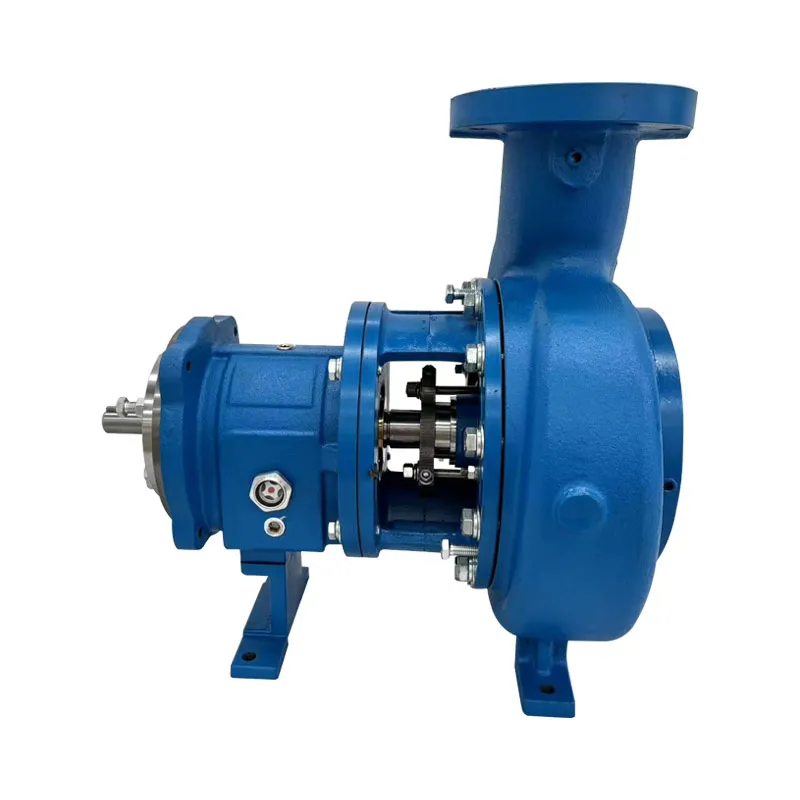Key Fundamentals of Chemical Process Pumps
2024-10-26
A chemical process pump is a specialized type of pump designed to handle the transfer and circulation of various chemical substances, including corrosive, toxic, and abrasive fluids. These pumps are critical in industries such as chemical manufacturing, petrochemical, pharmaceutical, food processing, and wastewater treatment, where safe and efficient handling of chemicals is required.
Key Fundamentals of Chemical Process Pumps
1. Material Selection
- Chemical process pumps are built with materials resistant to chemical corrosion, such as stainless steel, Hastelloy, titanium, or specialized plastics like PTFE (Polytetrafluoroethylene). The choice of material depends on the chemical composition, concentration, temperature, and abrasive properties of the fluids being pumped.
- For highly corrosive or toxic substances, non-metallic materials, or lined metal pumps, are often used to ensure durability and minimize risk.
2. Types of Chemical Process Pumps
- Centrifugal Pumps: The most common type, using an impeller to create flow. Ideal for low-viscosity fluids and available in various configurations like horizontal, vertical, and submersible.
- Diaphragm Pumps: Use a flexible diaphragm to create pumping action, especially suitable for highly viscous, corrosive, and slurry-type fluids.
- Magnetic Drive Pumps: A seal-less design where the drive and impeller are coupled magnetically, preventing leakage and ideal for handling hazardous chemicals.
- Peristaltic Pumps: Operate by compressing a flexible tube, suitable for high-viscosity, abrasive, and shear-sensitive fluids.
3. Seal Options
- Mechanical Seals: These prevent leakage by creating a tight seal around the pump shaft. They are available in single or double configurations, with double seals providing added protection in high-risk applications.
- Seal-less (Magnetic Drive): Magnetic drive pumps eliminate the need for seals, which reduces the risk of leaks and is particularly useful for handling toxic and hazardous chemicals.
- Packed Gland: In some pumps, a packed gland seal is used, where packing material forms a seal around the shaft, although it may not be suitable for highly hazardous chemicals due to the potential for minor leakage.
4. Performance Specifications
- Chemical process pumps are typically rated by capacity (flow rate), head (pressure), speed, and power requirements. These factors are adjusted based on the specific demands of the process, such as temperature, flow rate, and pressure of the chemical fluid.
- Flow rates and head requirements should be chosen to ensure the pump is neither overloaded nor underloaded, as either extreme can reduce efficiency and lifespan.
5. Temperature and Pressure Compatibility
- High or low temperatures and pressure levels in the chemical process may require specialized materials and pump configurations. Some pumps are designed with thermal barriers or heat-resistant materials to handle extremely hot or cold fluids without compromising safety or performance.
- Pressure ratings are also crucial, especially in processes with high-pressure requirements, and pumps are rated to handle pressures accordingly.

6. Applications of Chemical Process Pumps
- Chemical Processing: Transferring acids, bases, solvents, and other aggressive chemicals between process stages.
- Petrochemical and Oil & Gas: Moving hydrocarbons, additives, and process chemicals under high-pressure conditions.
- Pharmaceuticals and Food Processing: Pumping sensitive or sterile fluids where hygiene standards are strict and where precise, contamination-free transfer is essential.
- Water Treatment and Waste Management: Handling wastewater, slurries, and corrosive treatment chemicals in industrial wastewater plants.
7. Safety and Maintenance
- Chemical process pumps require regular maintenance to ensure safe operation. Preventive maintenance includes inspecting seals, checking alignment, and verifying material integrity, especially in high-wear components.
- Pumps with hazardous fluid handling capabilities often include additional safety features, such as leak detection, to prevent accidents.
Chemical process pumps play an essential role in enabling the safe, efficient, and effective handling of chemicals within industrial processes. By selecting the right pump type and materials, industries can ensure both reliable performance and safety in handling diverse chemical substances.


